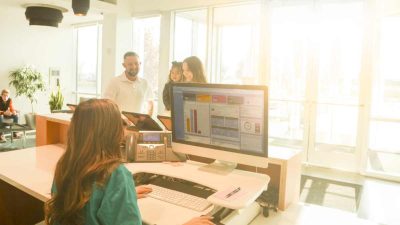What started as a “side hobby project” became a rare opportunity for two friends and University of Melbourne PhD researchers, Will Bodewes and Nisal Ranasinghe. For their Phonely AI technology, the pair has landed a spot in the world’s largest startup accelerator program in Silicon Valley, called Y Combinator.
Only 3% of the top startup companies are accepted into the program. Over the three months (July – September), Bodewes and Ranasinghe will receive coaching from the best entrepreneurs and successful business owners in the world. They also get access to funding, with half a million dollars of investment.
What is Phonely AI?
It started one frustrating day when Bodewes spent hours trying to accomplish simple tasks over the phone. Using artificial intelligence (AI), they developed a reception system that could mimic human interaction and handle calls efficiently.
Speaking to Locate2u, Bodewes says Phonely can store information, improving its ability to answer specific industry-specific questions. Analyzing the data could give a company insight into customers’ concerns and identify problems early on.
It can handle one million calls at “the same time” in different languages regardless of specific accents and industry-specific jargon.
This scalability is crucial for businesses with high call volumes, ensuring consistent support without the typical constraints of human-operated systems.
“It has the advantage of being able to scale up instantly based upon the call volume. [It’s] able to provide that same level of support while sounding like people over the phone,” explains Bodewes.
Financial implications
“So if you are looking at phone costs compared to a traditional human-based answering service, we’re about 70% cheaper than one of those systems,” says Bodewes.
But it’s also hyper-intelligent. “We can handle a lot more complicated issues than those places can,” he says.
ALSO READ: Startup advice for young entrepreneurs from AI PhD researcher
Early days of Phonely
Despite the doubts of failing, Bodewes and Ranasinghe realized they had something that could be a game changer for small businesses, where consistent customer support is vital.
“At the beginning, we didn’t know how much of it was possible and what was doable,” remembers Bodewes.
He says finding the finances to support the developers was difficult. “At the time, we had four developers working on this. Figuring out how we would pay for these people to continue and support them was a challenging time.”
After eight months of intense development, the breakthrough came with an invitation to be interviewed by Y Combinator.
Wise words for startups
Hoping to inspire other entrepreneurs, Bodewes says it’s difficult to give startups guidance, as there is no “playbook” that can set them up for success. Each startup is unique, with its challenges and possibilities.
Bodewes warns it’s hard work, long nights, and limited funds. “We’ve been burning the candle at both ends.” He says the most challenging part of setting up a startup is finding your feet without a blueprint; there is no “tried and true business model” to guide the way.

“My advice is just start; there’s no wrong way to start. It’s pretty hard, and you don’t know what to do most of the time.”
Bodewes warns that it won’t make sense most of the time. “If you feel like it’s easier… then you’re probably not working hard enough.”
Follow the journey
Bodewes and Ranasinghe are heading to San Francisco next month and have vowed to take other startups on their journey with them through social media.
“If you want to follow the LinkedIn journey… we’ll be posting regular updates and documenting the whole journey.”
About the author
Mia is a multi-award-winning journalist. She has more than 14 years of experience in mainstream media. She's covered many historic moments that happened in Africa and internationally. She has a strong focus on human interest stories, to bring her readers and viewers closer to the topics at hand.











